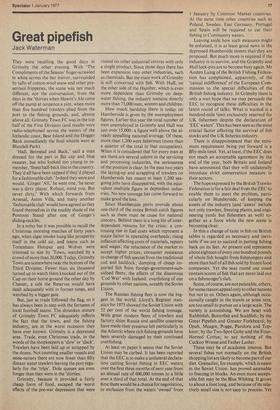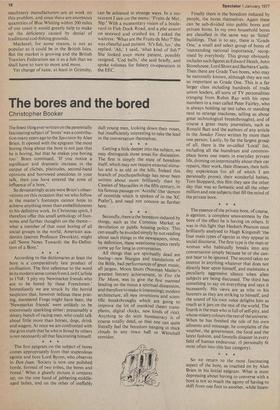Great pipefish
Jack Waterman
They were recalling the good days in Grimsby the other evening. With 'The Compliments of the Season' finger-scrawled in white across the bar mirror, surrounded by tufts of cotton-wool snow and other preaerosol fripperies, the scene was not much different, nor the conversation, from the days in the 'thirties when Hewitt's Ale came off the pump at tenpence a pint, when more than five hundred trawlers plied from the port to the fishing grounds, and, almost above all, Grimsby Town FC was in the top half of the First Division (and results were radio-telephoned across the waters of the Icelandic coast, Bear Island and the Dogger Bank immediately the final whistle went at Blundell Park).
'Hall, Betmead and Buck,' said a man dressed for the part in flat cap and blue sweater, but who looked too young to remember, 'finest half-back line in the country. They'd all have been capped if they'd played for a fashionable club.' Indeed they were and would. 'Ginger 'All,' he went one, 'he never was a dirty player. Robust, mind you. But never dirty.' With which forwards from Arsenal, Aston Villa, and many another 'fashionable club' would have agreed as they found themselves in the muddy shade of the Pontoon Stand after one of Ginger's sliding-tackles.
In a noisy bar it was possible to recall the Christmas morning matches of forty years ago, when cigar smoke hung like prosperity itself in the cold air, and teams such as Tottenham Hotspur and Wolves were trimmed to size by 'Town, watched by a crowd of more than 20,000. Today, Grimsby Town are somewhere near the bottom of the Third Division. Fewer than six thousand turned up to watch them knocked out of the Cup on their home ground the other day by Chester, a side the Reserves would have dealt adequately with in former times, and watched by a bigger gate.
But, just as trade followed the flag, so it has always been in step with the fortunes of local football teams. The shrunken stature of Grimsby Town FC adequately reflects the fact that the town, and the fishing industry, are in the worst recession they have ever known. Grimsby is a depressed area. Trade, even Christmas trade, in the words of the shopkeepers is 'slow' or 'slack'. Trawlers have been laid up or scrapped by the dozen. Not counting smaller vessels and seine-netters there are now fewer than fifty distant water trawlers leaving the port regularly for the 'trips'. Dole queues are even longer than they were in the 'thirties.
Grimsby, because it provided a fairly cheap form of food, escaped the worst effects of the pre-war depression that were visited on other industrial centres with only a single product Since those days there has been expansion into other industries, such as chemicals. But the main work of Grimsby is still concerned with fish. With Hull, on the other side of the Humber, which is even more dependent than Grimsby on deepwater fishing, the industry sustains directly more than 75,000 men, women and children.
How much hardship there is today on Humberside is given by the unemployment figures. Earlier this year the total number of men unemployed in Grimsby and Hull was just over 15,000; a figure well above the already appalling national average. Of these, more than 1,200 were fishermen (more than a quarter of the total in that occupation). When it is considered that for every man at sea there are several ashore in the servicing and processing industries, the seriousness of the position is clear. In the past two years the laying-up and scrapping of trawlers on Humberside has meant at least 1,200 seagoing jobs have disappeared, with the equivalent multiple figure in dependent industries. No new tonnage has come forward to make good the loss.
Since Humberside ports provide about one-third of the entire British catch figures such as these must be cause for national concern. Behind them is a long list of interdependent reasons for the crisis: a continuing rise in fuel costs which represent a major factor in operating overheads; rising inflation affecting costs of materials, repairs and wages; the reluctance of the market to accept higher prices; consumer resistance to change of fish species from the traditional cod and haddock; dumping of cheap imported fish from foreign-government-subsidised fleets; the effects of the disastrous 'Cod War' with Iceland; overfishing of our grounds by other nations, notably the Soviet Union.
The Russian fishing fleet is now the biggest in the world. Lloyd's Register statistics for 1975 showed the Soviet Union with 52 per cent of the world fishing tonnage. With great modern fleets of trawlers and factory ships Russia and satellite countries have made their presence felt particularly in the Atlantic where rich fishing grounds have been severely damaged by their continued overfishing.
At least on paper it seems that the Soviet Union may be curbed. It has been reported that the EEC is to make a unilateral declaration cutting Soviet fishing in EEC waters over the first three months of next year from an annual rate of 600,000 tonnes to a little over a third of that total. At the end of that time there would be a chance for negotiation, or exclusion from the waters 'owned' from I January by Common Market countries. At the same time other countries such as Poland, Sweden, East Germany, Portugal and Spain will be required to cut their fishing in Community waters.
Leaving aside how such measures might be enforced, it is at least good news in the depressed Humberside streets that they are proposed. But much more is required if the industry is to survive, and the Grimsby and Hull lock-pits are to become busy again. Mr Austen Laing of the British Fishing Federation has complained, apparently, of the 'casual indifference' of the European Commission to the special difficulties of the British fishing industry. In Grimsby there is only a wan hope that we may persuade the EEC to recognise these difficulties in the latest round of talks. What is wanted is a hundred-mile limit exclusively reserved for UK fishermen despite the declaration of 'EEC waters'. This has been seen as the most crucial factor affecting the survival of fish stocks and the UK fisheries industry.
There is disappointment that the minimum requirement being put forward is a fifty-mile limit. Yet, at least, if the EEC does not reach an acceptable agreement by the end of the year, both Britain and Ireland have announced that they will unilaterally introduce strict conservation measure in their sectors.
The hope expressed by the British Trawler Federation is for a fair deal from the EEC to enable them to meet the problem, particularly on Humberside, of keeping the assets of the industry (and 'assets' include not only trawlers, freezing plants, and engineering yards but fishermen as well) together as a force while the new scene is becoming clear.
In this a change of taste in fish on British tables is regarded as necessary and inevitable if we are to succeed in putting fishing back on its feet. At present cod represents about eighteen of every one hundred pounds of whole fish bought from fishmongers and more than half of all fish sold by frozen food companies. Yet the seas round our coast contain scores of fish that are never laid out on a fishmonger's slab.
Some, of course, are not palatable, others, for some reason appeal only to other nations but not to us. Others again, although occasionally caught in the trawls or seine nets, are too small to pursue on a large scale. The variety is astonishing. We are beset with Rabbitfish, Butterfish and Scaldfish; by the Great Pipefish and Greater Forkbeard; by Opah, Meagre, Pogge, Pandora and Topknot; by the Two-Spot Goby and the FourHorned Cottus; to say nothing of the Cuckoo Wrasse and Father Lasher.
These may be of academic interest. But several fishes not normally on the British shopping list are likely to become part of our diet. Grenadier, for example, which is eaten in the Soviet Union, has proved amenable to freezing in blocks. An even more acceptable fish may be the Blue Whiting. It grows to about a foot long, and because of its relatively small size is not easy to process. Yet
machinery manufacturers are at work on this problem, and since there are enormous quantities of Blue Whiting within 200 miles of our coast it would greatly help to make up the deficiency caused by denial of traditional cod-fishing grounds.
Mackerel, for some reason, is not as popular as it could be in the British Isles. But the market is growing and the British Trawlers Federation see it as a fish that we shall have to turn to more and more.
Yet change of taste, at least in Grimsby,
can be achieved in strange ways. In a restaurant I saw on the menu: 'Fruits de Mer, 50p.' With a momentary vision of a boulevard in Fish Dock Road, and a plat assorti on seaweed and crushed ice, I asked the waitress: 'What are the Fruits de Mer?' She was cheerful and patient. It's fish, luv,' she replied. `Ah,' I said, 'what kind of fish?' She looked even more patient, possibly resigned. 'Cod balls,' she said briefly, and spoke volumes for fishery co-operation in the EEC.























































 Previous page
Previous page